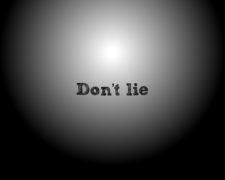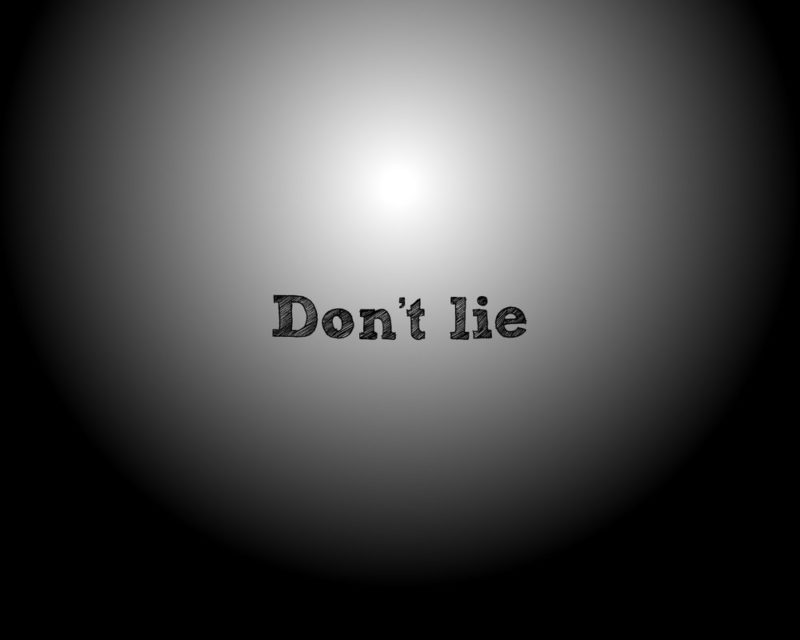*From the dusty archives…
Try to think of one person you’ve met who doesn’t lie. It’s impossible. From the moment we’re old enough to start having some shred of freedom to make decisions as children, we lie. Of course when young children do it, we tend to call it a “fib” or a “white lie” because this implies that it is not a big deal. ”Johnny, did you color on your wall?” ”No mommy.” Johnny says this even though he’s an only child and the only one in his room all day. Why? Because the power that Mommy has over him scares him and he’s afraid to tell the truth because he knows there will be consequences and he doesn’t want to deal with them.
We also deceive in order to:
- Avoid disapproval
- To manipulate
- To maintain control
- To avoid consequences
- To save face for ourselves or others
That is really the essence of why people lie. As adults we may try to convince ourselves or others that lying is a good way to spare someone’s feelings or avoid a sticky situation. It becomes so routine that we do it almost involuntarily and even when we don’t need to lie. Ever ask a co-worker how they’re doing and they say “great”? Then a day later you learn they just lost their house or their spouse lost their job? But, the person lies to you so they don’t have to deal with explaining how they really feel. Most people would argue that this type of lie is about saving face or keeping things private. That’s fine. It’s still lying.
So, knowing that every one of us tells little half-truths, lies by omission, and some tell outright huge lies, what are some signs we can look for to determine if we’re being lied to? As managers or leaders, how can we tell when it’s happening? Working in HR certainly gives one the upper hand in spotting deception. After years of interviewing, questioning, and investigating employee relations issues, I’ve been able to learn what to watch for. Here are a few common tell-tale signs:
- Body language– When someone is being honest, they will turn their body toward you. They will look you in the eye and you will not see them being nervous. If the person is lying, they will do all they can to look away or down without realizing it. They will fidget and move their hands either to their face or mouth.
- Speech and word choice– In my experience, I’ve found two extremes in this area. Some people will talk more quickly and become defensive. You’ll notice that they are speaking in a way not normally characteristic of their behavior. The other extreme is that the person may shut down. They become quiet and do not want to answer your questions. They also tend not to use words like “I” or “Me” in what they are telling you. This is a subconscious attempt not to take responsibility for what is going on.
- Changing the subject- Another tell is that the person will try to get you off the current line of questions and change the subject so that they can feel comfortable again.
- Avoidance- You may not know that someone is lying behind your back. One way to tell is the person will begin dodging you. Do you have an employee that is normally friendly and chatty and suddenly they are not taking your calls or avoiding you when they see you coming? It’s a definite sign that they’re avoiding you for a reason and this is a subconscious way people cut you out.
There are many other signs, but these are the ones that are often most noticeable. What signs tell you that someone is lying to you? Share them in the comments.




4 Comments
This is completely unscientific. The Truth is you can’t always tell a lie from a truth. If that were possible police wouldn’t rest the wrong person and court wouldn’t convict the inocent. If you believe someone has lied and out makes a difference then you must investagate thoroughly.
@Denise- Thanks for the comment. I don’t disagree with you- I’m not a scientist and my examples are based on my personal experience over my career in HR. I will say that your comment made me look to see what scientific evidence there is. While not perfect 100% of the time, there were many examples of studies by the CIA, FBI, other police interrogators as well as psychologists that seem to find similar tell-tale signs to at least watch for. Here’s a link to an article on that. http://www.forbes.com/2006/11/03/detecting-lies-trust-tech_06trust_cx_ee_1103lies.html
The point of my post is not science but what each of us can do to watch for the most typical signs and also to not deceive ourselves that there are people who don’t lie to us. Thanks so much for reading and commenting.
WHAT?? I have been lied to? I find after 30+ years in HR, I have to sometimes tamp down my cynical side during “fact finding missions”. But I take heart in the knowledge that most employees are really good and honest and the HR team only gets exposed to the ne’re-do-wells because that is what we do. The worst part is when I have uncovered wrongdoing within HR. Has happened twice at previous companies.
I think every good HR specialist should have at least basic knowledge of psychology along with couple years of experience. Then there’s only little chance somebody can trick you imho.
Nice article anyway. Thanks.
Cyril Kramar
http://www.mcroygroup.com